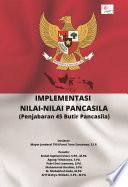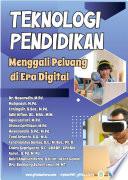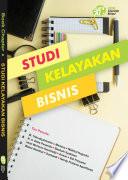
Implementasi Nilai-Nilai Pancasila (Penjabaran 45 Butir Pancasila)
Pancasila sebagai dasar negara menjadi sendi utama dalam pembentukan karakter bangsa. Masyarakat Indonesia adalah masyarakat yang plural dengan semboyan Bhineka Tunggal Ika, berberda-beda tetap satu jua. Dengan kondisi inilah, perlu adanya landasan ideologi mental yang kuat yang dapat menyatukan keberagaman ras, budaya, dan suku. Melalui Pancasila terbentuk manusia yang berketuhanan, berperikemanusiaan, adil dan beradab, bersatu, demokratis, dan berkeadilan sosial. Konsep ini termaktub dalam butir-butir Pancasila sebagai dasar filsafah bangsa. Melalui pemahaman terhadap butir-butir Pancasila, diharapkan kepada masyarakat Indonesia untuk dapat mengimplementasikannya ke dalam kehidupan sehari-hari. Hal ini bertujuan untuk mewujudkan Negara Kesatuan Republik Indonesia.
- ISBN 13 : 6234982522
- ISBN 10 : 9786234982527
- Judul : Implementasi Nilai-Nilai Pancasila (Penjabaran 45 Butir Pancasila)
- Pengarang : Endah Septiani Utari, S.Pd., M.Pd., Agung Trilaksono, S.Pd., Pebri Dwi Lesmono, S.Pd., Muhammad Ibrahim, S.Pd., M. Misbakhul Huda, M.Pd., Arif Wahyu Widodo, S.Pd., M.Pd., S.Pd., M.Pd., Agung Trilaksono, S.Pd., Pebri Dwi Lesmono, S.Pd., Muhammad Ibrahim, S.Pd., M. Misbakhul Huda, M.Pd., Arif Wahyu Widodo, S.Pd., M.Pd., S.Pd., M.Pd., Agung Trilaksono, S.Pd., Pebri Dwi Lesmono, S.Pd., Muhammad Ibrahim, S.Pd., M. Misbakhul Huda, M.Pd., Arif Wahyu Widodo, S.Pd., M.Pd., S.Pd., M.Pd., Agung Trilaksono, S.Pd., Pebri Dwi Lesmono, S.Pd., Muhammad Ibrahim, S.Pd., M. Misbakhul Huda, M.Pd., Arif Wahyu Widodo, S.Pd., M.Pd., S.Pd., M.Pd., Agung Trilaksono, S.Pd., Pebri Dwi Lesmono, S.Pd., Muhammad Ibrahim, S.Pd., M. Misbakhul Huda, M.Pd., Arif Wahyu Widodo, S.Pd., M.Pd., S.Pd., M.Pd., Agung Trilaksono, S.Pd., Pebri Dwi Lesmono, S.Pd., Muhammad Ibrahim, S.Pd., M. Misbakhul Huda, M.Pd., Arif Wahyu Widodo, S.Pd., M.Pd., S.Pd., M.Pd., Agung Trilaksono, S.Pd., Pebri Dwi Lesmono, S.Pd., Muhammad Ibrahim, S.Pd., M. Misbakhul Huda, M.Pd., Arif Wahyu Widodo, S.Pd., M.Pd., S.Pd., M.Pd., Agung Trilaksono, S.Pd., Pebri Dwi Lesmono, S.Pd., Muhammad Ibrahim, S.Pd., M. Misbakhul Huda, M.Pd., Arif Wahyu Widodo, S.Pd., M.Pd., S.Pd., M.Pd., Agung Trilaksono, S.Pd., Pebri Dwi Lesmono, S.Pd., Muhammad Ibrahim, S.Pd., M. Misbakhul Huda, M.Pd., Arif Wahyu Widodo, S.Pd., M.Pd.,
- Kategori : Antiques & Collectibles
- Penerbit : CV Jejak (Jejak Publisher)
- Bahasa : id
- Tahun : 2023
- Halaman : 211
- Google Book : https://play.google.com/store/books/details?id=Rtu1EAAAQBAJ&source=gbs_api
-
Ketersediaan :
Pancasila sebagai dasar negara menjadi sendi utama dalam pembentukan karakter bangsa.









